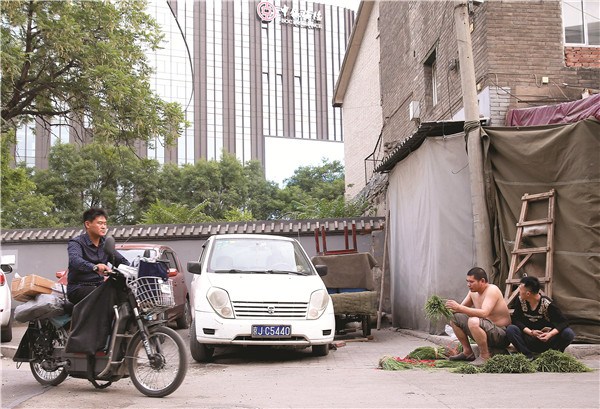
She was referring to one of Asia's largest developments of shopping malls, office buildings and hotels, which is located only 1 kilometer east of the Forbidden City, the Chinese imperial palace for five centuries. The plaza started operation in 2000.
In the short term, the protection and preservation of hutong is certainly not profitable as opposed to the sale of the land they stand on, especially when protecting and renovating hutong areas requires significant investment, she explained.
However, the hutong do have intrinsic value and calculations about their worth change in the long run.
"The preservation of hutong raises the value of the entire area and the city," she said. "It takes vision to do the correct cost-profit analysis."
World apart
Near to He Huizhong's house stands the famous courtyard where Lu Xun, a leading figure in modern Chinese literature, used to live and where Lu completed many well-known works. According to his book, Lu who died in 1936, also enjoyed looking up at the pagoda that today so captivates He.
One street away lies the financial district known as Beijing's Wall Street where people in suits meet in five-star hotels and where China's top banks have their headquarters. While He likes his neighborhood farmers' market, people can also choose to buy their vegetables from supermarkets packed with imported goods.
"Before the financial street had its facelift, it was just like Baitasi. Large numbers of buildings were demolished and people were relocated to apartment blocks," He said. "Now Baitasi is like its poor brother. I always wonder what people think of us when they stand in the tall buildings across the street."
He and his wife live in an 18-square-meter home built by his father within the front yard of a courtyard once owned by a prestigious family. Today, the courtyard is home to six families and many of the classic architectural features are long gone.
It is easy to tell how many families share such courtyards; all you need to do is count how many electricity meters hang next to the shared entranceway.
"Protecting the Old City of Beijing is much more complicated and challenging than protecting a porcelain vase from the Song Dynasty (960-1279). It is a vast and constantly transforming area where people live and work," said He Shuzhong, the founder of the CHP.
On one hand, as cultural icons of Beijing, a few hutong have become so popular with tourists that local residents find all the attention too much and preservationists worry about the potential risk to historic buildings from the massive crowds. But on the other hand, most hutong residents live in less popular and well known neighborhoods and have their own challenges to deal with that include cramped living conditions and shared bathrooms.
In response to the challenges facing one popular hutong area, the local government in Dongcheng district issued a ban in April on large tour groups visiting Nanluoguxiang, a 740-year-old hutong that is lined with shops, restaurants and bars.
"Many outsiders urge the government to protect hutong because they see them as historical sites but many people living in them actually want to move out because they see them as old and dangerous houses," said Hu Xinyu from the CHP who is also co-founder of the Courtyard Institute, an alternative educational institution dedicated to promoting traditional culture.
Hu, a Beijing native, said the renovation of hutong areas still present far bigger challenges for governments at all levels than their demolition.
"Currently, different parties including the government, architects and the city planners are carrying out research into hutong renovation projects," Hu said. "It is hard to tell what hutong will be like in the future, but one thing for sure is that the best way to preserve hutong is to improve the lives of the people who live in them."


















































